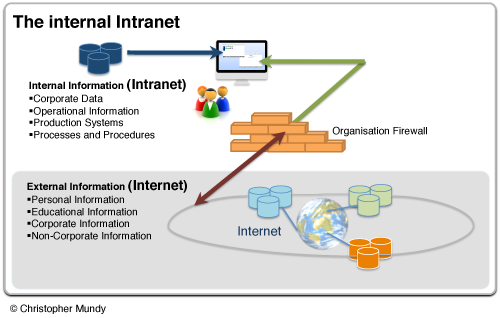 Intranets are the equivalent of the Internet inside an organisation, sometimes called a ‘private version of the Internet’.
Intranets are the equivalent of the Internet inside an organisation, sometimes called a ‘private version of the Internet’.
They allow groups within an organisation to communicate to each other utilising web enabled technologies.
Examples of Intranet site uses are as follows:
- Publicise activities
- Provide access to documentation, forms and multi-media more easily
- Provides the opportunity that allows other teams to communicate to the originating team through a web form.
- Provide access to back-end systems, e.g. special development environments and tools
- Post policies and procedures online for people to access
- Provide newsletters for team activities
- Provide access to schedules for release and change management
- Provide access to log reports
- Provide online conferencing access and information
- Provide a gateway to other systems
- Internal room and vehicle booking systems
- Stationary requests
- Feedback and Contact
An Intranet allows an organisation to leverage its current internal communications to provide additional and sometimes more effective coverage than previously available.
Why an Intranet?
A reasonable question… After looking at the above list of possibilities, let’s have a look at the reason why many organisations use Intranets
Increased Workforce Productivity
Most users in an organisation have access to a web browser, for example Internet Explorer. If an Intranet is implemented correctly, users can find information quickly allowing them to perform tasks more efficiently. A worker can access information anywhere from a workstation within an organisation where a browser is connected to network and security allows them.
Better use of Time
More corporate information can be made available to parties, minimizing the amount of email traffic, correspondence and time consumed between workers searching for information, through other channels of correspondence such as meetings, telephony, etc.
Improved Communications
Intranets provide an excellent platform for communicating to the masses within an organisation. This is especially useful for sharing for example, strategic information. Another feature is the potential ability (if the reporting tools are deployed) to monitor traffic and measure access to the information.
Extensibility for Business Operations
Besides the useful points of communication, improved productivity and time, an intranet can be extended to integrated web based applications to undertake tasks. An example of this could be as follows:
- Requesting an official file
- Booking systems
- Travel systems
- Logs to backend system analysis
- Display of communications traffic
- Online pro-active analysis of production environments
Cost Effective
Instead of maintaining hard copy physical information (a manual), an Intranet can store the information online where it can be easily accessed and printed if and when required.
Promotes corporate culture
Everyone is viewing the same information from the same source.
So, what then is the motivation for an organisation having an Intranet?
It can be said… “Team A utilises an Intranet site to provide a communications channel to its stakeholders across the Corporations network. This allows Team A to more easily fulfil its goals stated in the Organisations Communications Plan.”
Several examples to support the reason behind this are stated in the table below taken from the Communications Plan.
Aligning the Intranet with the Organisation’s Communications Plan
It is important to always relate the purpose of an Intranet back to the Organisations Communications Plan.
Technology for an Intranet
Whether you are a large or small organisation you can build an Intranet on a variety of Technology platforms.
Large organisations usually use a proprietary commercial off the shelf system for this type of activity. On the other hand a small business could use even Microsoft Excel to start off an Intranet. Cheap, easy, crude, but hey, it can be done!